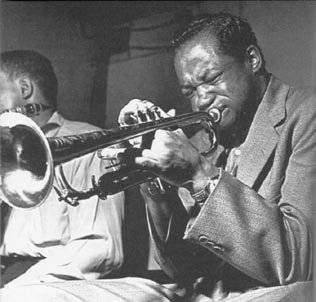
Clifford Brown and Max Roach, Delilah.
Art Farmer and Gigi Gryce, A Night at Tony's.
Horace Silver and the Jazz Messengers, Stop Time.
Horace Silver and the Jazz Messengers, Doodlin'.
So what was "hard bop", really? The cynical might say it's a handy bit of jazz taxonomy, in which the variegated ambitions of dozens upon dozens of musicians were conveniently assembled under a category so broad that it seems like Barnes & Noble designed it.
Or you could try to twist a metaphor out of it (A preacher playing fours with a nightclub drummer? A New Orleans boy walking in Chicago in a new suit? Who gets mugged?), though that gets ridiculous fast.
In a simple sense, hard bop is bebop played with more structure and, some would say, more soul. You can start hearing it in recordings from the late 1940s, in Tadd Dameron/Fats Navarro's band, or some of the Bud Powell trio sessions, or in the early recordings of the musicians who would be most identified with the label--the drummers Max Roach and Art Blakey, the pianists Horace Silver and Elmo Hope, saxophonists like Hank Mobley, the trumpeters Lee Morgan and Clifford Brown (the protean Miles Davis shows up for a while too).
It was, in a way, a correction--bop, now ten years old, had never found a mass audience, which had been drifting away from jazz for some time. Hard bop, with its gospel and blues influences, was a way to reconnect with the street.
Where a Charlie Parker bop piece like "Ornithology" begins with a head theme played instensely fast and simultaneously by trumpet and saxophone, a typical hard bop piece would, instead, feature more counterpoint--the saxophone playing the melody, the trumpet chiming in, providing accents, chords, coloring. Bop would go at Chuck Yeager speeds; hard bop favored a medium-tempo groove. Bop often sounded raw, almost brutal, offering only shards of melody the listener had to dig up; hard bop reveled in lyricism and arrangements--even the drum solos had structure.
Listen to Clifford Brown and Max Roach's "Delilah", from their first LP, which follows most of the hard bop rules (in effect, writing the book).
Gary Giddins: "Delilah, the most unlikely of vehicles (an undulating Hedy Lamarr prop), begins single-file—bass vamp, cymbals, piano vamp, tenor vamp—before Brown states the theme as though staring down the throat of the cobra he's charming. Harold Land [tenor sax], who had much of Wardell Gray's sandy sound and finesse, offers a bouquet of melodies; then Brown enters with a three-note figure that he develops through the bridge. He ends the chorus blazing and detonates the next one with a heart-stopping rip. [Pianist Richie] Powell, who wrote the inventive chart, plays trebly chords, neat modulations, and a Grieg finish, followed by fours with Roach, who adds a melodic chorus of his own."
"Delilah" is the opening track of Clifford Brown & Max Roach; it was recorded on August 2, 1954, in Capitol Studios in Hollywood.

A lesser known but also brilliant hard bop duo was the trumpeter Art Farmer (above) and the alto saxophonist Gigi Gryce, who here offer up "A Night at Tony's." Farmer takes the first two choruses, and then it's a turn for Bryce and Horace Silver on piano. Recorded on May 19, 1954,with Percy Heath on bass and Kenny Clarke on drums. On When Farmer Met Gryce.
And then listen to the aristocrats of hard bop: the Jazz Messengers, anchored by Horace Silver and the phenomenal Art Blakey.
Silver's "Stop Time" retains a strong traditional bop flavor, opening with 16 bars of a fast unison theme. The soloists in order are Kenny Dorham (trumpet), Hank Mobley (who turns in a sinuous tenor solo), Silver's piano and then Blakey, who spars with Dorham and Mobley and then stomps out on his own.
The glorious "Doodlin'", a soulful 12-bar blues, is a showcase for Silver who, after a sweet opening solo, also provides brilliant comping behind Dorham and Mobley; Blakey comes in again toward the end for some demolition work.
Both recorded on December 13, 1954. Find on Horace Silver and the Jazz Messengers.
Give the last word to Art Blakey, talking to Nat Hentoff in 1957: "All we do is try to play music, just basic music. Other people put names to it; I don't put names to music. It's just swinging. If we don't swing, it isn't jazz. That's all. That's all we've got is swinging. How are you going to swing if you don't swing hard? How can you swing easy? Even if you play soft, you have to swing hard. Jazz is going to sell itself; it doesn't need any names like 'hard bop.'"
No comments:
Post a Comment